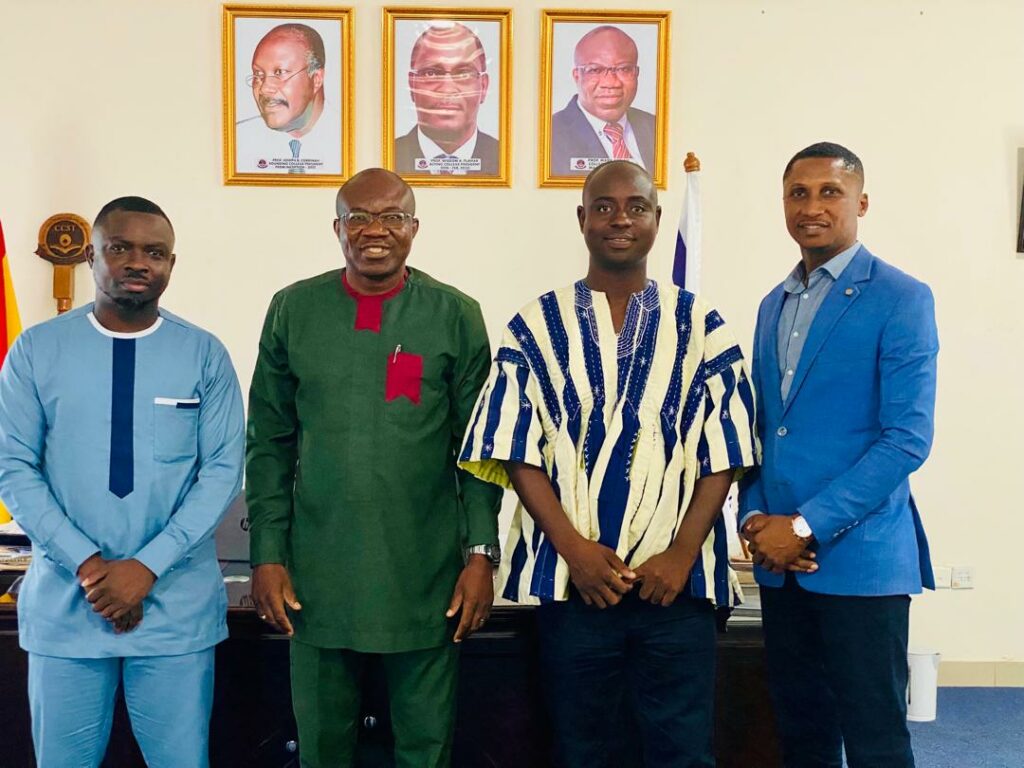Professor Mark Appiah, President of the CSIR College of Science and Technology, is calling on the government and stakeholders to intensify efforts in integrating Science, Technology, Engineering, and Mathematics (STEM) into Ghana’s Technical and Vocational Education and Training (TVET) landscape.
He argues that a more robust STEM-TVET integration is essential for building a forward-looking workforce capable of powering Ghana’s industrialisation drive and thriving in the digital economy.
Prof. Appiah made this passionate appeal when a delegation from the African Progressive Research and Innovations in Learning – STEM (APRIL-STEM) paid a courtesy call on him at his office in Cantonments, Accra. The delegation included Mr Daniel Aboagye (CEO), Mr Louis Nana Asiedu (Project Coordinator), and Mr Dwomoh-Doyen Benjamin (COO).
Commending both the New Patriotic Party (NPP) and the National Democratic Congress (NDC) governments, Prof. Appiah acknowledged that Ghana has made significant strides in recognising TVET’s role in reducing youth unemployment and advancing skills development.
“This recognition has gone beyond rhetoric,” he stated. “We have witnessed the establishment of the Commission for TVET (CTVET), the Ghana TVET Service, the Education Strategic Plan (2018–2030), and the TVET Transformation Agenda—all aimed at modernising and expanding TVET offerings nationwide.”
Yet, Prof. Appiah maintains that more needs to be done. He expressed concern over the persistent perception of TVET as a “last resort” for academically underperforming students, describing it as a damaging stereotype that must be dismantled.
“TVET must be seen as a prestigious and modern path, not a fallback option,” he stressed, advocating for sustained public education campaigns, rebranding initiatives, and visibility for successful TVET alumni and entrepreneurs. He also recommended improved career counselling in junior and senior high schools to help students appreciate the diverse, high-potential opportunities within TVET.
Addressing the mismatch between TVET training and labour market needs, Prof. Appiah highlighted gaps in digital literacy, soft skills, and entrepreneurial readiness.
He urged the adoption of work-based learning models—such as internships and apprenticeships—with incentives for industry partners to provide real-world training opportunities.
On STEM integration, Prof. Appiah called for a comprehensive, strategic approach. “This isn’t about just adding subjects—it’s about transforming the way skills are taught, learnt, and applied to meet the needs of today’s economy,” he said.
He outlined four key strategies:
- Innovation Hubs and MakerSpaces: Establishing hands-on labs across TVET institutions to encourage experimentation and tech-based problem solving.
- Instructor Capacity Building: Upskilling TVET instructors through modern STEM methodologies like design thinking and inquiry-based learning, supported by scholarships and incentives.
- Competitions and Exhibitions: Organising regular STEM-focused contests to foster creativity, critical thinking, and teamwork among students.
- Entrepreneurial Integration: Encouraging the use of STEM in launching small-scale ventures and tech-driven services, thereby bridging education and enterprise.
The APRIL-STEM team applauded Prof. Appiah’s long-standing contributions to education and innovation. They noted that their success has largely hinged on helping students apply theoretical knowledge to solve real-world community problems—a vision they believe Prof. Appiah shares.
“As APRIL-STEM looks to scale our impact nationwide, we are confident that working with Prof. Appiah will bring substantial value to our mission,” they affirmed.
Prof. Appiah, in turn, praised APRIL-STEM’s educational work in the Biakoye District and lauded their offer to support The Hope Network, a youth-based NGO, with expertise toward establishing a new STEM Centre at Tapa Amanfrom in the Oti Region.
Concluding his remarks, Prof. Appiah called for deeper collaboration between policymakers, educators, industry players, and development partners. “If we align investment, partnerships, and policies around a STEM-focused TVET strategy, Ghana can produce a skilled, future-ready workforce that drives sustainably national development,” he declared.
Click the link Puretvonline.com | WhatsApp Channel to join the WhatsApp channel
GOT A STORY?
Contact/WhatsApp: +233243201960 or Email: manuelnkansah33@gmail.com

